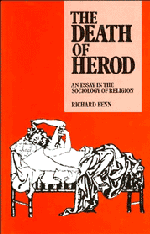Book contents
- Frontmatter
- Contents
- Acknowledgments
- Introduction
- 1 Two methodological viewpoints: the priestly and the prophetic
- 2 Description, interpretation, and explanation: modes of analysis
- 3 Levels of observation and of analysis: making the right choices
- 4 “What is going on here?” The role of the observer and the beginnings of theory
- 5 The search for useful concepts: evil and charisma
- 6 The making of a theory
- Epilogue
- References
- Author index
- Subject index
- Index of biblical citations
1 - Two methodological viewpoints: the priestly and the prophetic
Published online by Cambridge University Press: 07 January 2010
- Frontmatter
- Contents
- Acknowledgments
- Introduction
- 1 Two methodological viewpoints: the priestly and the prophetic
- 2 Description, interpretation, and explanation: modes of analysis
- 3 Levels of observation and of analysis: making the right choices
- 4 “What is going on here?” The role of the observer and the beginnings of theory
- 5 The search for useful concepts: evil and charisma
- 6 The making of a theory
- Epilogue
- References
- Author index
- Subject index
- Index of biblical citations
Summary
In approaching antiquity, students of Christian origins will be approaching a very strange world indeed. Fortunately, however, other communities, equally strange but closer to our own time, have been studied in depth by social anthropologists. Their descriptions can at least open up a set of questions for us to pursue as we study the far less accessible world of first-century Palestine. In this chapter, for instance, I will rely heavily on two recent works by social anthropologists; both of them focus on ways that traditional communities seek to secure for themselves the sources of life from one generation to the next.
SOCIETAL SELF-REPRODUCTION
To guarantee that a community will continue despite the death of its members over time is not easy. Each community must be sure, for instance, of its own spiritual continuity with the past. In this chapter we will note how a community seeks to ensure that the spirit of the ancestors lives on in the new-born, fertilizes its fields, endows its leaders with authority and holds off the threat of evil and death from the community itself. It is as if those who have died possess the secret of the community's life and remain the sources of its vitality. Access to the dead means ownership and control over the sources of life. That is a strange world indeed to moderns, who live in a world that tends to separate the living from the dead and to locate the sources of a community's vitality as much in its skills and achievements as in its cultural inheritance.
- Type
- Chapter
- Information
- The Death of HerodAn Essay in the Sociology of Religion, pp. 33 - 54Publisher: Cambridge University PressPrint publication year: 1992



